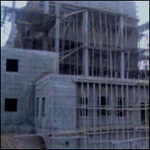When the International Atomic Energy Agency’s Board of Governors meets next week, Syria’s case will be high on its agenda. Syria is suspected of building, at a site known as Dair Alzour, an undeclared nuclear reactor that was destroyed by an Israeli airstrike in September 2007. The IAEA has found strong evidence to support this accusation but, as yet, no proof. It has repeatedly asked Syria for greater access on a voluntary basis. Syria has repeatedly refused. It is now time for the IAEA to move beyond such voluntary requests and invoke its most powerful inspection provision, the "special inspection," to make its requests for access legally binding. If Syria refuses then the Board should make a formal finding of "non-compliance."
As highlighted in its report of 19 February, the IAEA investigation into Syria has reached something of a dead-end. Inspectors found a number of anthropogenic uranium particles “of a type not included in Syria’s declared inventory of nuclear material” but cannot verify whether Syria was conducting nuclear activities at Dair Alzour without more access and information. It is important for Syria to provide the plans for the original building and to answer all of the IAEA’s questions promptly. Most crucially, however, inspectors must be able to inspect the three other sites for which the IAEA has intelligence and procurement-related information that suggests a nuclear connection.
As matters currently stand, Syria will succeed in unilaterally and permanently stalling the IAEA investigation by denying access. This situation is unacceptable. To avoid it, the first step is for the IAEA to make its access requests legally binding by invoking its right to conduct a special inspection. Special inspections give the IAEA, when it has a reason, the authority to inspect undeclared sites in a state.
Special inspections ought to be a key element of the IAEA’s verification regime but they are not. According to public records, this provision has only been invoked in two cases. In 1992 Romania actually asked to be inspected to build confidence that it had abandoned the Ceausescu regime’s nuclear weapons programme. A year later, the IAEA asked for a special inspection in North Korea. North Korea refused, touching off a crisis that left the IAEA hesitant to ask for this access elsewhere—including in additional cases in which it was certainly deserved.
Syria is the textbook definition of a case in which a special inspection is merited. If the IAEA fails to ask for one, it will hand future states suspected of non-compliance an extraordinarily powerful precedent to use in opposing a special inspection request. IAEA officials regularly complain about their lack of legal authority—and rightly so. But, in this instance, they will have only themselves to blame if they let the authority that they do have atrophy.
If the IAEA does ask for a special inspection, Syria may refuse access. In this case the Board of Governors would have sufficient grounds to find Syria in non-compliance with its safeguards agreement because the IAEA would then be “unable to verify the non-diversion of nuclear material” (within the meaning of the agreement “non-diversion” includes the failure to declare nuclear material). Again, if this provision is not used now, it risks becoming unusable.
Unfortunately, in November of last year, while speaking against ceasing technical cooperation on reactor development with Syria, the IAEA Director General seemed to ignore this when he stated that "people and countries are innocent until proven guilty." As eminently fair as this principle is when applied to people, it is not the standard set out in states’ comprehensive safeguards agreements—the agreement with the IAEA that all non-nuclear-weapon states party to the Nuclear Non-Proliferation Treaty are obliged to conclude. The principle of “innocent until proven guilty” is dangerous when applied to states because it allows a non-compliant state to avoid its guilt being proven by denying the IAEA access. In contrast, an accused person cannot simply stop a police investigation in the same way.
The limitations of the "innocent until proven guilty" approach have become apparent from recent events in Iran. During the IAEA’s six-year long investigation, Iran has frequently failed to provide full and proactive cooperation. Now that the IAEA has turned its attention to alleged activities directly connected with the development of nuclear weapons, Iran’s cooperation has almost completely ceased. Indeed, in his last three reports the Director General blamed Iran for the inspectors' inability to make “any substantive progress” on resolving these issues. Yet, Iran has incurred no additional consequences for its lack of cooperation.
Finding Syria in non-compliance, if it refuses a special inspection, would help correct this precedent. It would, however, not necessitate the immediate imposition of economic or political sanctions. Having found Syria in non-compliance the Board would be obliged to refer the case to the Security Council—but it could delay doing so. The referral could be "for information purposes only," and not for sanctions, depending on Syria’s cooperation. In particular, if it cooperates fully and proactively with inspectors, Security Council members could make it clear that Syria will not be sanctioned—even if the building at Dair Alzour turns out to have been a reactor. This strategy would make the possibility of consequences for continued non-cooperation more credible without escalating the situation unnecessarily. Just as importantly, it would help the IAEA to reassert its right to conduct all necessary inspections and to stop the gradual erosion of its legal and political authority.
Dr. James M. Acton, associate in the Nonproliferation Program at the Carnegie Endowment for International Peace in Washington, co-authored Abolishing Nuclear Weapons (Abingdon, Oxon: Routledge for IISS, 2008).
Mark Fitzpatrick, senior fellow for Non-Proliferation at the International Institute for Strategic Studies in London, authored The Iranian Nuclear Crisis: Avoiding Worst-Case Outcome (Abingdon, Oxon: Routledge for IISS, 2008).
Dr. Pierre Goldschmidt is nonresident senior associate at the Carnegie Endowment for International Peace, and former Deputy Director General of the International Atomic Energy Agency, Head of the Department of Safeguards.





